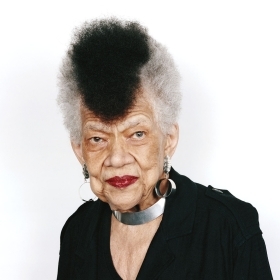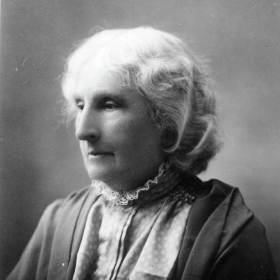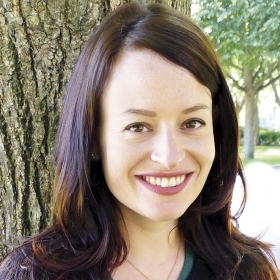When Lisa Shaw Brucken ’89 was 32, she and her partner decided to marry, even though same-sex marriage wasn’t legal at the time. “We wanted to be a family and have the same last name,” Brucken says. “We went back and forth on whose name to take—we both wanted the other’s last name.”
Instead, they decided to create a whole other last name. They came across the name Moriath, which Brucken says evokes a Celtic princess who’s a teacher and a healer. She and her partner legally changed their names and gave their daughter the new name.
When they later split and Brucken decided to remarry—this time to a man—she again weighed her name-changing options. “My husband is more of a feminist than I am. He had no expectations,” she says. “He was actually surprised when I said, I think I want to change my name. I just like having the same last name as my partner—it’s easier. But I struggled very hard with not having the same last name as my daughter, so I kept Moriath as my middle name.”
Brucken’s decision represents the changing face of women’s name decisions in the 21st century. With the increasing prevalence of same-sex marriages, interfaith unions, and second- and third-time brides, marriage in America is shifting. And with it, so are the complexities behind the decision to change or keep a name.
The data on women keeping their birth names in the US show a steady surge starting in the 1970s, peaking in the 1990s with 23 percent of married women keeping their names, according to a 35-year study published in the Journal of Social Behavior and Personality in 2009. The authors of “The Bride Is Keeping Her Name” analyzed 2,400 wedding announcements printed in the New York Times between 1971 and 2005. By the early 2000s, they found, the number of women keeping their own names had dropped to 18 percent.
Before the 1970s, most women assumed new names on their wedding days. When Maureen Kuwano Hinkle ’53 graduated from Wellesley and married a few years later, she took her husband’s name because “the expectation was that you changed your name.”
But when she divorced a few decades later, she reverted to using her maiden name in addition to her married name. “I did not want to change my [married] name because my kids were named Hinkle,” she explains. Also, she had published under that name. But she viewed her birth name as part of her ethnic identity (Japanese), so she started also using it—Kuwano—on her passport, Social Security card, and driver’s license.
Rosanna Hertz, Class of 1919 50th Reunion Professor of Women’s and Gender Studies and professor of sociology, says that in the 1970s and ’80s, she saw women increasingly viewing marriage as an unequal institution where women’s identities were subsumed in their husbands’. Women decided to keep their names as one reaction—specifically, well-educated women who had advanced degrees and were established professionally under their birth name. Hertz herself was one such example: “When I got married, I was published and known under my name in academic circles. I just wasn’t going to take my husband’s name, and he didn’t care either. So, I didn’t.”

She says that in the early years of her marriage, it used to annoy her that relatives and others would address invitations to her and her husband as “Mr. and Mrs. X.” “There was a sense of them ignoring my choice, which I found annoying, and assuming a kind of tradition that I didn’t want assumed,” she says. “And now, [invitations being addressed incorrectly] don’t bother me in the same way.”
A 2011 study out of Wayne State University in Michigan found that a bride’s age and level of education are strong predictors of whether she will keep her own name. Women who wed when they are 35 to 39 years old are 6.4 times more likely to keep their names than women who marry between the ages of 20 and 24, Ernest Abel and Michael Kruger wrote in “Taking Thy Husband’s Name: The Role of Religious Affiliation,” published in Names: A Journal of Onomastics.
You may wonder why I’ve spent a lot of time lately reading the data on name-changing trends among brides. I come to the issue honestly—I’m getting married in a few months, and I still don’t know what I’m going to do with my last name.
I’m 32 and have focused so much of my post-Wellesley time on my career. I’ve gotten jobs, been published, and introduced myself time and again as “Teal Pennebaker.” Then again, I’ve also not gotten jobs, been rejected by editorial boards, and been forgotten moments after introducing myself as “Teal Pennebaker.”
But it’s a name I know. It’s a name that is mine. I even own tealpennebaker.com.
Back in Texas, where I’m from, my mom grappled with this issue when she married my dad in 1972. She was a feminist, but she didn’t feel terribly close to her family. So she changed her name, and didn’t seem to regret it much, and—let’s be honest—Pennebaker is a pretty great last name.
Increasingly, I’ve come to believe that it’s nice to have one family/one name under one roof. I want kids of my own, and I’d like to share a name with them. But at what cost? Do I change my name? Does my husband change his name, as someone who’s come into his own by the same name for 33 years? Do we hyphenate and create an 18-letter monstrosity of a name for everyone involved?
I was convinced there is no good answer, but I also knew I wasn’t facing this decision alone. I’d watched as several of my Wellesley friends struggled with the same issue, and thought it would be interesting to see what the wider alumnae community thought about it.
I created an online survey to better understand the landscape of how Wellesley women have handled—or will handle—the name game as they face marriage, civil unions, children, divorce, and remarriage. I wanted to glimpse the trends among decades of graduates, find out how alumnae reached their decisions about keeping or changing their names, what they did with their kids’ names, whether their mothers had changed or kept their names, and—most importantly for me, in a selfish way—whether they were happy with their own name decisions.
Close to 1,000 alumnae responded to the survey in the fall of 2013. While many more alumnae from the post-1990 class years completed it, there was enough representation from the 1970s and 1980s to get a clear sense of what Wellesley women have chosen. (Only 23 alumnae from the 1950s and ’60s participated.) About half of alums responding have kept or will keep their birth names and, when accounting for those who hyphenated or created a new version of their name (for example, combining it with their spouse’s to create a whole new name—i.e., my fiancé’s name, Blodgett, and Pennebaker, becoming Blodgebaker), that number jumps to 58 percent. That leaves 32 percent of surveyed alums who will change or have changed their name upon marrying (6 percent are undecided, 3 percent didn’t answer the question).

Here’s the breakdown of alums who are married or in a civil-union partnership and have kept some version of their last name (or their spouses have taken their name):
- ’70s = 58 percent
- ’80s = 56 percent
- ’90s = 60 percent
- ’00s = 62 percent
As interesting as the survey numbers are the narrative responses alumnae provided about their reasoning on whether to change their names or not. The two most important reasons alums provided for their name decisions were their sense of identity and connectedness to their families. Survey respondents in same-sex couples were more likely to have their wives take their names or hyphenate. As one ’77 alumna put it—“Since I changed my name so it matches my spouse’s … I feel pride in our union every time I sign my name! It has really made a positive difference to me, and I’m so glad I realized I wanted to do it.”
Among respondents, 107 out of 959 (about 11 percent) had mothers who did not change their last name. Of those 107 alums, 73 also decided to keep their birth names. Daughters may be likely to follow a new family pattern.
One such alumna, from the class of 2004, wrote, “My mom kept her name, so for me, it was the default option. Before getting married, I considered the name-change question briefly, but my name just felt more ‘me’ and I wanted to keep it. I think the fact that my husband is Japanese (I’m American) and we generally live in Japan had something to do with my strong feelings on the matter. Keeping my name was part of holding on to my American identity, as well.”
Not surprisingly, many alumnae who kept their names pointed to their professional lives as a big consideration in the decision. These women have published under their birth names, are known in their fields by those names, and don’t want to have to attempt to rebrand themselves.
I was surprised that another one of the more frequent decision points for alums was pure logistics. Many alumnae noted the logistical nightmare of getting a new Social Security card, driver’s license, and changing credit cards and email addresses. On the flip side, alumnae noted—with great frequency—the hassle of having a family with a different last name.
Somewhere in the middle of this logistics question is Laura Becker-Lewke ’77, who decided to hyphenate her name after a double date. The other couple—engaged to be married a few weeks after college graduation—were in a heated argument about whether the wife should take her husband’s name. “I turned to (my now husband) Reynold [Lewke] and said, ‘How would you feel if you woke up and were Reynold Becker?’” Laura Becker-Lewke says. “He said, That’s ridiculous—that’s not the name I grew up with, not my family name, not the name I have my MIT degrees in. And I turned to him and said, ‘Thank you, sweetheart. You just made my point.’ At that point I decided to hyphenate.”
Becker-Lewke’s hyphenated approach was shared by 5 percent of alumnae graduating in the 1970s. That figure stayed constant for subsequent decades, peaking among alums from the 2000s at 7 percent. Meanwhile, about 10 percent of alumnae responding to the survey have hyphenated their children’s last name.
The issue of children’s last names proved complicating for many alumnae. A large portion of respondents wrote of wanting to have one name for one family, and not wanting to be the odd woman out in a family named X. Many women wrote of keeping their birth names professionally but using their married names for school forms and neighborhood activities.
One alumna from the class of ’01 wrote about struggling with this issue, having decided not to change her name. But, on a recent plane trip, after being separated from her husband because they didn’t share a last name, the couple considered hyphenating their names so they would have the same names as their children. “Oh, the struggles never end!” she wrote. “And what about when our children marry? Will they triple-hyphenate?”
I was the most interested in whether Wellesley women felt at peace with their choice to change or keep their name. The majority of respondents were satisfied with their decisions. In a handful of instances—often women who had gone through divorces—alumnae said they wished they had never changed their names.
In reviewing the nearly 1,000 responses, I realized that my own feelings on changing my name actually had become more complicated. I suddenly had a new line of considerations—kids, the frequency of divorce and remarriage, the role of traditional expectations, the possibility of indignant family members (on either side of the issue!).
My big take-away from the Wellesley name-change game is there isn’t an easy solution. And that, not surprisingly, Wellesley women are complex and vocal in their decisions. Knowing, though, that women on any possible side of this issue generally felt good about their choices gave me some peace of mind.
At this point, I might just buy a url with my fiancé’s last name as well. To keep my options open.








We ask that those who engage in Wellesley magazine's online community act with honesty, integrity, and respect. (Remember the honor code, alums?) We reserve the right to remove comments by impersonators or comments that are not civil and relevant to the subject at hand. By posting here, you are permitting Wellesley magazine to edit and republish your comment in all media. Please remember that all posts are public.